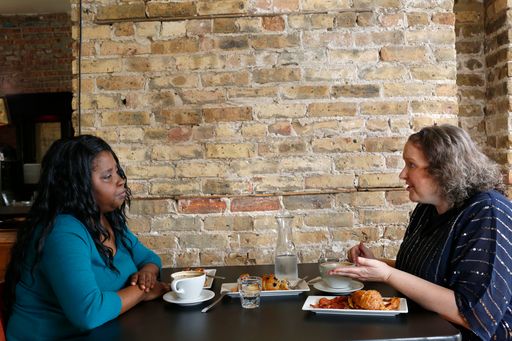Special promotional content provided by Gilda’s Club of Madison:
When cancer strikes, it’s not just the person with the diagnosis that is impacted. Often, the entire family is affected. In particular the primary caregiver for someone with cancer can experience isolation, exhaustion, and burnout. Relationships, work, and finances can all be impacted by the cancer diagnosis. It can also impact your mind, body, and spirit in a variety of ways.
Who is a caregiver?
Often the role of caregiver is thrust upon us without time to process what that means. Some step into it willingly, while others are reluctant. Your role may include going along to medical appointments, providing emotional support, providing day-to-day care to the person with cancer, and possibly even cooking, cleaning, or toileting. You are a caregiver if you are dedicating time, energy, and emotional energy to the person with cancer.
When does stress become something bigger?
Burnout, while not a clinical diagnosis, is a state of emotional, physical, and/or mental health exhaustion caused by a prolonged state of distress. In some cases, it can be identified by symptoms of depression or anxiety. When a prolonged state of distress and worry begin to make you feel drained, it’s time to seek help. You don’t have to face the stress of caregiving alone.
Where can a caregiver find resources and support?
The Cancer Support Community offers a free, national helpline 1-888-793-9355 that is staffed by community navigators, resource specialists and a helpline navigator who have over 170 years of combined experience helping people affected by cancer. The helpline provides guidance, resources and support to cancer patients or their loved ones with a variety of needs—from getting information about cancer, identifying a local support group or just finding someone who is willing to listen. Helpline resources are available in over 200 languages and include:
- Connecting callers to local or national resources, including support groups, transportation services and other programs
- Short-term cancer coping assistance
- Short-term housing resources
- Treatment decision planning
- Financial navigation regarding the costs of cancer and its treatments
- Specialized information and navigation in pediatric oncology, finances, clinical trials, and genetics/genomics
- Access to an online distress screening tool for both patients and caregivers.
In Southwest Wisconsin, a local Gilda’s Club branch of the Cancer Support Community is available in Madison to provide a variety of free support programs, including:
- Weekly, professionally-facilitated support groups for adults with a cancer diagnosis, caregivers, teens, and children.
- Healthy living and educational programming
- Monthly support groups to meet the needs of cancer patients and caregivers
- Post-treatment support to help you find your “new normal”
- Patient advocacy
- Short-term individual or family counseling
- “Open to Options” treatment decision counseling
All Gilda’s Club programs are being offered virtually during the COVID pandemic. You can learn more about resources available through Gilda’s Club Madison by visiting https://www.gildasclubmadison.org/ or calling 1-608-828-8880.
What is resilience in relation to a cancer diagnosis?
Resilience is the ability to bounce back and weather a difficult experience. There are a variety of ways a person living with cancer or acting as a caregiver can demonstrate strength and resilience through times of stress. These could include: reliance on humor, ability to see silver linings, relying on faith, or finding meaning in a challenging situation. One of the key ways a caregiver can bolster their resilience is by practicing self-care.
What is Self Care?
You can ensure you are the best caregiver possible by taking care of yourself during this time. Nourish your body. Move as much as you can. Listen to your emotions. Engage in something that is creative and purposeful. Practice mindfulness or seek grounding exercises.
Learn more about how to avoid burnout while caring for a loved one with cancer by watching this video provided by Gilda’s Club Madison featuring Carissa Hodgson, LCSW, OSW-C. In particular, the caregiver checklist provided will give you some great resources to help you get through this challenging time as a caregiver.




























